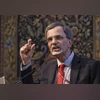)
Chief Economic Advisor V. Anantha Nageswaran (File Photo: PTI)
Artificial intelligence (AI) can both augment and displace labour, and there is a need to choose the right balance between the two. The onus is as much on the government as on the private sector to think about the medium-term consequences of AI, Chief Economic Advisor V Anantha Nageswaran said on Wednesday.
“If we have to avoid the social consequences of capital-intensive or technology-intensive growth… we need a bigger compact between the private sector, government, and the public so that we can enjoy the demographic dividend and achieve our dreams of becoming a developed nation by 2047 while maintaining both social and economic stability,” Nageswaran said, highlighting that it is important to find the right balance between capital and labour.
The CEA, addressing an event by the All India Management Association (AIMA), said that labour should be treated as a resource and asset since it involves humans with emotions. He said that viewing capital and labour purely from the economic framework of scarcity versus surplus is a wrong approach. He cited the example of how the treatment of labour as a commodity has led to the evisceration of small towns and cities in the developed world.
Stressing that labour force participation in urban India hasn’t returned to pre-Covid levels, the CEA said that post-pandemic, the Indian industry has conveniently entered flexible labour arrangements, leading to lower wage and benefits bills. “From FY 2020 to FY 2023, corporate profits went up by 4x,” he said.
However, Nageswaran, noting some of the positive developments, said that the number of firms with more than 100 workers has grown faster than the firms with fewer than 100 workers.
“There is a need for the creation of jobs with protection, with the regularity of salary payments through banking channels, and with post-employment retirement benefits and health insurance,” the CEA added.
He said that since it is not known what the looming presence of artificial intelligence would do to services sector employment, one should not, or cannot, abandon the agriculture sector itself as a source of employment generation.
Earlier in the day, while speaking at an event by the Federation of Automobile Dealers Association (FADA), the CEA said that the sale of automobiles is an important barometer of consumer demand and private consumption, and he is confident of automobile sales picking up in the coming months in urban areas.
“In the first five months of this fiscal, rural sales of automobiles outpaced urban India. In the first three months of this financial year, there was a general election, and public capex was also a little bit slower. As this kicks into high gear and more and more contracts are awarded and the flow of liquidity improves along with private sector capex, it will automatically lead to an improvement in urban demand as well in the coming months with respect to automobile sales,” he added.
First Published: Sep 11 2024 | 7:33 PM IST









